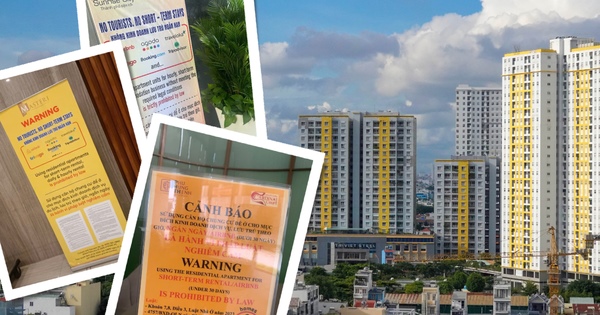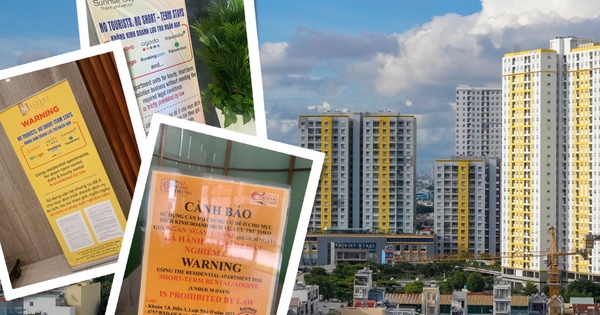There are concerns that the ban on short-term rentals through Airbnb by apartment buildings in Ho Chi Minh City stems from a misunderstanding and misinterpretation of the current legal regulations. As a result, experts emphasize the need to lift the ban and instead establish appropriate legal frameworks that balance the interests of individuals and the state’s management requirements.
Recognition is Necessary
Immediately after Ho Chi Minh City issued Decision No. 26/2025, effective from February 27, many apartment buildings in the area simultaneously announced a ban on short-term rentals, regardless of whether the owners were individuals with business registration or legally operating enterprises. According to Mr. Le Hoang Chau, Chairman of the Ho Chi Minh City Real Estate Association (HoREA), the prohibition on using apartments for short-term rentals has severely impacted many owners, causing them not only to lose customers but also to compensate for contract terminations. They face financial pressures due to the loss of income used to repay bank loans. He attributed the cause to a misinterpretation of the provisions of Articles 12 and 13 of Ho Chi Minh City’s Decision No. 26/2025.
Meanwhile, Ms. Nguyen Thuong Hoai, representing approximately 1,000 Airbnb landlords in Ho Chi Minh City, stated that she had petitioned various agencies for over a year. She affirmed that the Ministry of Construction and the Ho Chi Minh City National Assembly Delegation clearly responded that there is no regulation prohibiting such rentals.
From a tenant’s perspective, Ms. Le Thuy, an American-Vietnamese, shared that her family of five could not rent an apartment during their three-week vacation in District 3 because landlords required a minimum lease of two months. Hotels, on the other hand, did not have large enough rooms, and renting 2-3 rooms would be costly and inconvenient.
Ms. Hoang Kim, a resident of District 7, mentioned that her family travels abroad every summer, from South Korea to Malaysia. Short-term apartment rentals are prevalent in these countries, suitable for large families. Therefore, she believes that international visitors to Vietnam require similar options.
Lawyer Ha Hai, Vice Chairman of the Ho Chi Minh City Bar Association, shared the view that Decision No. 26 of the Ho Chi Minh City People’s Committee is not prohibitive but rather aimed at management. Thus, according to him, apartment management boards should lift the ban to allow citizens to continue their rental activities, provided they meet all legal requirements. Specifically, the apartments used must be in mixed-use buildings and meet the requirements for tourist accommodation establishments. Individuals and organizations engaging in accommodation services must comply with regulations on business conditions, tourism industry standards, and relevant legal provisions.
Mr. Le Hoang Chau also emphasized the necessity of a clear legal framework that permits the pilot implementation of the Airbnb model in Ho Chi Minh City, recognizing it as a legitimate business. This model requires business registration, legal management, residence registration, and full tax payment. This approach not only aligns with international practices but also contributes to tourism development, job creation, and increased state budget revenue. According to Mr. Chau, Resolution 98 on Ho Chi Minh City’s special mechanism and the orientation towards building an International Financial Center provide a favorable premise for piloting and developing this type of accommodation. In the long run, Airbnb needs to be recognized as an official tourism accommodation service industry.
 Several apartment buildings in Ho Chi Minh City have posted signs prohibiting short-term rentals. Source: SON NHUNG – HOANG TRIEU |
Appropriate Management Methods are Essential
On the other hand, Ms. Giang Huynh, Director of Research and Consultancy at Savills Ho Chi Minh City, expressed concern that short-term rentals in apartment buildings could create chaos in resident management. According to her, the uncontrolled entry and exit of guests pose security risks and negatively impact long-term residents. She also argued that if this activity is not properly registered and taxed, it will result in budget losses and adversely affect traditional accommodation types such as hotels and serviced apartments.
However, Mr. Ta Trung Kien, Director of News Property Real Estate Company, suggested that if Ho Chi Minh City is granted special mechanisms, it can permit short-term rentals in apartment buildings, provided strict management is implemented. Accordingly, apartment owners should register for household business and inform the building management about their intention to rent through Airbnb. Additionally, the management can apply higher management fees for rental apartments to compensate for common area usage. Of course, these apartments must also meet fire safety requirements.
Mr. Kien believes that the negative perception of this form of rental stems from a small number of irresponsible tenants, particularly young people, who use the apartments for gatherings, drinking parties, and even prohibited substance use. Such cases should be strictly handled, rather than imposing a blanket ban on everyone.
From another perspective, Mr. Pham Lam, Vice President of the Vietnam Real Estate Brokers Association, opined that the short-term rental prohibition is a temporary measure due to ineffective management, which potentially infringes on citizens’ property rights. “If citizens legally own the property, they have the right to rent it out in any form that the law does not prohibit,” he emphasized. “In cases where tenants cause disorder, it is the tenants’ violation and should not be attributed to the landlords.”
According to the Vice President of the Vietnam Real Estate Brokers Association, appropriate management methods are necessary to bring short-term rentals within the framework of the law, instead of adopting a “if it can’t be managed, then ban it” approach, as this will have long-term negative effects on the value of apartment assets.
Son Nhung
– 05:28 15/05/2025
“Consumer Credit in Ho Chi Minh City Sees Positive Growth”
Consumer credit outstanding in Ho Chi Minh City reached VND 1,137 trillion as of the end of March 2025, marking a 2.3% increase from the previous year’s end. This surge in consumer credit activity signifies a robust and expanding consumption demand, positively influencing production, business, trade, tourism, and service activities across the region.
Making Way for 100,000 Affordable Homes
To meet the target of delivering 100,000 social housing units by 2030 as set by the Prime Minister, Ho Chi Minh City is leaving no stone unturned with a slew of initiatives.
The New West Side Story: Binh Chanh’s Rise in the Urban Restructuring Race
The heart of Ho Chi Minh City (District 1 and District 3) is congested, and the rise of new central hubs is inevitable for restructuring this modern metropolis. Following the success of Thu Duc City, Binh Chanh is rapidly establishing itself as the next growth pole, boasting both scale and a visionary development plan.





















